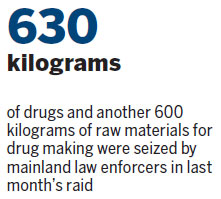7 HK people arrested in drug bust
Updated: 2016-01-22 09:51
By Shadow Li in Hong Kong and Zheng Caixiong in Guangzhou(HK Edition)
|
|||||||||
Seven Hong Kong residents were arrested among 20 suspects in a major international drug-trafficking syndicate busted last month, Guangdong police announced on Thursday.
A local crime expert said organized crime adapted quickly to changing circumstances, despite tighter controls on cross-border crimes by the mainland, Hong Kong and nearby regions.
Domestic and overseas drug traffickers had used the channel to transport and smuggle methamphetamine, informally known as "ice", ketamine and ecstasy pills produced in Guangdong, to Hong Kong, Taiwan, Southeast Asian countries and the rest of the world in the past, according to Deng Jianwei, director of drug enforcement with Guangdong provincial department of public security.
In this latest raid, mainland law enforcers seized 630 kilograms of drugs and another 600 kilograms of raw materials for drug making.
A United Nations report published in 2015 labeled Hong Kong and the mainland as key players in the burgeoning narcotics trade in Asia. Drug syndicates use Hong Kong to export the drugs made on the mainland to Southeast Asia and Australia, according to the report.
"Domestic and overseas drug traffickers have never stopped their efforts to build Guangdong into a major drug production base and distribution center," Deng said.

In December 2013, Guangdong police sent out some 3,000 officers to stop a mass drug production village in Lufeng. About three metric tons of crystal meth was seized, along with 182 suspects in the village, mostly surnamed Cai. The Cai clan, believed to be drug suppliers in Southeast Asia, has been the dominant drug-making cartel in South China since 2002.
An expert in cross-border issues, Professor Sonny Lo Shiu-hing, at the Hong Kong Institute of Education said cross-border criminals operated mostly through clanship. Such groups have thrived and could adapt well to the changing environment.
Lo described the issue as a long-standing one, as Hong Kong is a free trade city. With growing economic integration, cross-border crime poses a challenge for law enforcement departments across the regions. This is despite increased cooperation to combat surging illegal activities.
After years of cooperation, Lo said, mainland law enforcers are also modernizing and learning from Hong Kong counterparts in curbing organized crime.
Contact the writers through [email protected]
(HK Edition 01/22/2016 page10)